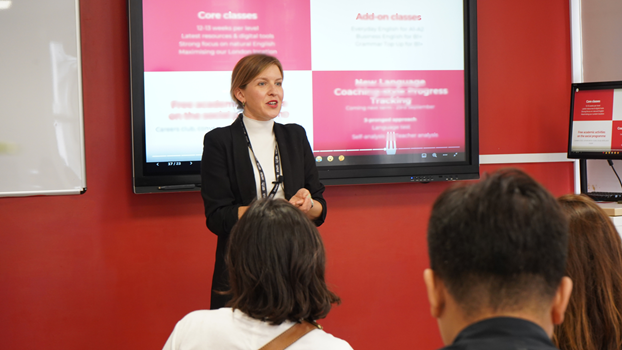
English for work - Networking and presentations
English has become the language of international business. In the first blog article, I spoke about some of the principles of written and spoken communication in the UK. I talked about how to write an email, what to consider when writing an email and why you often need to avoid being too direct when speaking and writing, with examples of how I navigate professional conversations.
Now let’s talk about networking and presentations.
Networking
Whether you work in Sales or Marketing, as a freelancer or if you go to events on behalf of your company, networking is the key to successful business.
Networking allows you to create and build new relationships with other professionals in your industry and/or connect with potential clients and customers. Networking seems more straightforward if you’re someone who finds it easy to connect with new people, but if you’re shy (like I am) and speaking to strangers is scary, there are some tips and tricks to help you feel more comfortable:
● Are you attending a networking event by yourself? As a freelancer, unless you’re attending a networking event that is specifically focused on your job, you might often attend events that are general for the industry. In these cases, ask yourself:
– What is my purpose for attending this event? Is it to get to know other professionals in your field or to attract investors or new clients?
– What do I want to achieve from it? Give yourself a small target, for example, “I want to speak to five new people” or ‘I want to speak to this specific person”
– Have I prepared something to give away, such as a business card, or something to say that is very memorable so the people I meet don’t forget me? If you prepare something to give away, a business card is better than a portfolio, but be prepared to access your portfolio and talk about it if someone shows very keen interest. You can put a QR code with a link to your portfolio on your business card.
● If you’re attending an event with your colleagues who are more confident than you:
– Get them to introduce you and have a general chat with the other professionals there. Then you can say how much you enjoyed a particular seminar, webinar, presentation etc. and take it from there
– Ask your colleagues to introduce you as a specialist in your field; my colleagues, who knew I found networking stressful, often introduced me as a CRM or subscription marketing specialist. This allowed me to better network with professionals who did jobs similar to mine and learn from them as well as share my knowledge
● If you’re looking to network with someone specific:
– Are they giving a seminar, chairing a panel, or speaking on a panel that is relevant to your career? Go to see them after the panel, seminar or webinar, and tell them “I really enjoyed hearing you speak about X on the panel” You can then take the conversation from there.
– My biggest regret from a Marketing event I attended a few years ago was missing the chance to meet and talk with a Marketing professional and writer I really love. I was sitting behind him and he was being approached by many people, but it took me over 10 minutes to find the courage to say something. And
then he had to go on stage. Some professionals are used to being approached for their work – as long as you are polite and respectful of their time, it’s not a problem. What I should have said was: “Hi X, my name is X, I work in CRM/subscriptions marketing and I am a huge fan of your articles in X magazine. Could I…?” and then seen how he responded. He was very nice to everyone else, so chances are that he would have been pleasant to me too.
Listen to some testimonials from our students who took our Business English course:
Presentations
I studied English Literature at university – standing in front of an audience and presenting ideas
was never something I wanted to do professionally, but here I am. When you network, you can choose to be as active as you want,but when presenting there is no way to avoid being the centre of attention. Here are a few tricks that have helped me to present proposals and pitch projects successfully before:
– Know your audience
You’ve probably heard this before. It is key in business meetings to know who you are speaking to. For example, presenting to a CEO and/or CFO means you’ll be asked a lot about how it will impact the business’s finances. Presenting to your direct manager might mean addressing their concerns and talking about how quickly something can be done.
– Tell them what and how you are going to do something
Time is a valuable tool in business – after all, you only have eight or nine hours a day in which to do your job. The most successful presentations I have attended, or done myself, have been the ones which have addressed concerns in a direct manner. For example, ‘I’m presenting today how strategy Y will resolve problem X in Z time’ or ‘I’m proposing that we implement idea Y which will save X time and bring us Z revenue.’ This will be your introduction. During the presentation or pitch, you can go into some detail as to how you will solve the problem, but not too much – here you show off that you know the business, how it works and the tools you have at your disposal.
– Practice, practice, practice
It’s true that practice makes perfect. Especially when English is your second language, you can find that some things are a little more difficult to pronounce – and don’t forget, it’s always worse when you’re nervous. Take a deep breath, and practise the difficult parts of your presentation at home by
recording yourself or rehearsing them with someone you trust to give you useful feedback.
The part I have always found most stressful when presenting is the Q&A (Questions and Answers). You can’t be sure what questions will be asked, but if you know your audience you can predict which questions are most likely. Prepare yourself to be able to answer these – it will help you feel calmer and more confident.
Tip: Sometimes when someone asks you a question, you panic – you’re not sure you understood the question or you don’t know how to answer it. My personal advice is to make sure that you understand the question correctly and buy yourself more time to think about the answer by repeating or paraphrasing the question back to them. So, if someone has asked me ‘Where is the benefit in implementing this strategy for email marketing?’, I ask them ‘You’d like me to confirm what the benefits of this strategy are for our email marketing campaign?’.
During our Business English courses, you’ll be given the opportunity to practise pitching ideas and networking to raise your confidence for the next time you need to present or network at work.



2 Responses
Your blog is a true hidden gem on the internet. Your thoughtful analysis and in-depth commentary set you apart from the crowd. Keep up the excellent work!
Your writing is like a breath of fresh air in the often stale world of online content. Your unique perspective and engaging style set you apart from the crowd. Thank you for sharing your talents with us.